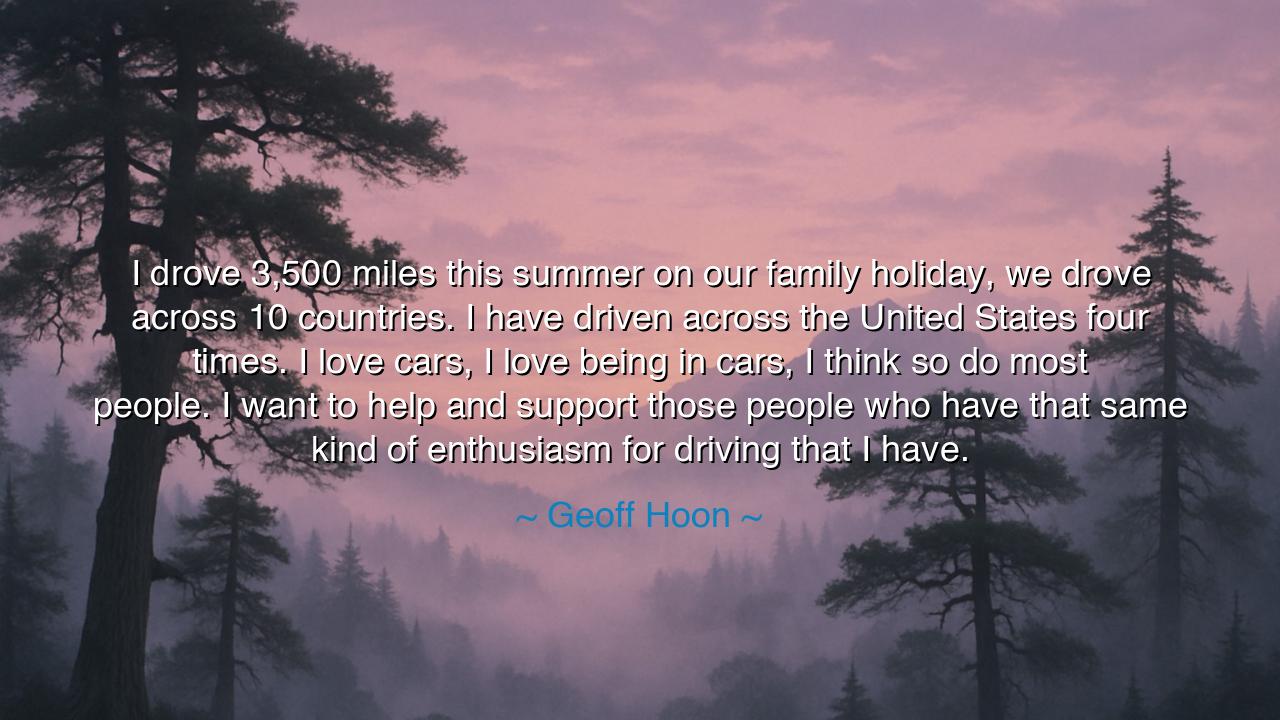
I drove 3,500 miles this summer on our family holiday, we drove
I drove 3,500 miles this summer on our family holiday, we drove across 10 countries. I have driven across the United States four times. I love cars, I love being in cars, I think so do most people. I want to help and support those people who have that same kind of enthusiasm for driving that I have.






Host: The highway stretched endlessly beneath a sky of fading amber, the sun melting into the horizon like a slow-burning memory. Dust rose behind the tires of a lone car parked at the edge of a desert road, its chrome body catching the last flares of light. Heat still shimmered above the asphalt, though the evening air began to cool, brushing against the skin with the quiet breath of nightfall.
Jack leaned against the hood, cigarette between his fingers, eyes reflecting the distant glow of the dying day. Jeeny sat on the passenger door, legs crossed, her hair caught by the wind, her face half-lit, half-lost in shadow.
Host: They had driven for hours without a word, the radio humming softly — an old blues tune about freedom and roads that never end. The silence between them carried the weight of something unsaid, something deeper than miles or maps.
Jeeny: “Do you ever wonder why we keep driving, Jack? Mile after mile, as if the motion itself could make us feel alive again?”
Jack: “Because it does. The road, Jeeny — it’s the last place where a man can still feel his own pulse. Every turn, every engine’s roar — it’s proof that you’re not just part of the machine. You’re still in control.”
Host: He took a drag, the smoke curling upward, vanishing into the dusk.
Jeeny: “Control? Or escape? Geoff Hoon once said he loved cars, loved the freedom of the drive — that he wanted to help those who shared that enthusiasm. But maybe that’s the illusion, Jack. Maybe we don’t love the drive — maybe we’re just running from stillness.”
Jack: “You talk like stillness is some kind of virtue. The world moves, Jeeny. People build, trade, travel. The road is our artery. It’s how civilization breathes. The first car wasn’t built to escape — it was built to connect.”
Host: Her eyes narrowed, catching the glow of a passing headlight that sliced the dark for a fleeting second.
Jeeny: “Connect? Jack, you call it connection, but look around. Highways cut through forests, cities choke with exhaust, and we call it progress. The same roads that carry us to our holidays also carry war, waste, and noise. Is that connection, or is it just a more comfortable kind of disconnection?”
Jack: “That’s poetic, but naive. You want to talk about connection? The American road system built in the 1950s — it tied an entire continent together. Families could travel, businesses could grow, and dreams could actually move. Sure, there’s a cost, but that’s what progress means — trade-offs.”
Jeeny: “And what about the cost we can’t measure? The silence of birds where there used to be woods? The children who grow up thinking the earth is just something to cross, not something to know?”
Host: Her voice trembled, but not with weakness — with conviction, like a flame trying to survive the wind.
Jack: “You think we can just go back to horses and dirt paths? You think romance replaces infrastructure? The car is not the enemy, Jeeny. It’s the symbol of human fr






AAdministratorAdministrator
Welcome, honored guests. Please leave a comment, we will respond soon